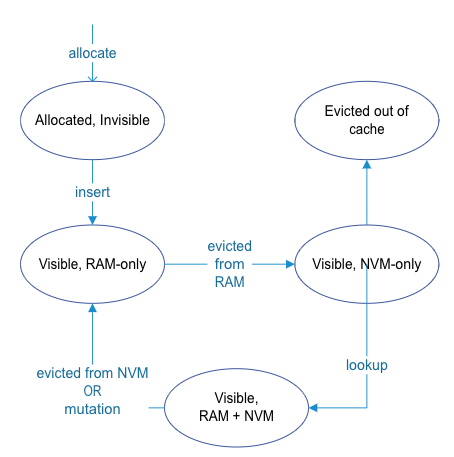Item and Handle
An item is the fundamental memory allocation backing an object in cache. Throughout this guide, we sometimes use item and allocation interchangeably. We use allocation when we discuss memory allocation or footprint. And we use item when we want to emphasize cached objects. An item is associated with a key and a byte array allocated by the allocate() method. We use the key to look up the item.
There are 2 types of Handle: ReadHandle and WriteHandle.
A ReadHandle is similar to a std::shared_ptr<const Item>. Cachelib APIs like find() returns a ReadHandle.
A WriteHandle is similar to a std::shared_ptr<Item>. Cachelib APIs like allocate(), findToWrite()and insertOrReplace() return a WriteHandle.
Because an item may be accessed concurrently, to ensure that the underlying memory backing the item is valid, use its ReadHandle to access it for read-only purpose and use WriteHandle to access it for read & write purpose. This guarantees that during the lifetime of the ReadHandle / WriteHandle, its item will never be evicted or reclaimed by any other thread.
However, ReadHandle / WriteHandle does NOT synchronize between read and write access to the item's memory. They're only used to indicate to CacheLib if an access is intended to be read-only or read/write. To properly synchronize between concurrent reads and writes to Item::getMemory(), user must implement their own synchronization on top. (e.g. use a SharedMutex to synchronize reads and writes).
To ensure consistency of data across HybridCache (Ram & NVM), we need to know whether user is performing a read or a write. For example, requesting a WriteHandle via findToWrite() API is more expensive than requesting a ReadHandle via find() API in the context of NvmCache as it incurs an invalidation call to this item's copy in NvmCache.
An item's handle also provides future semantics offered in HybridCache. Calling toSemiFuture() via a ReadHandle or a WriteHandle will return folly::SemiFuture<ReadHandleImpl>. User who uses SemiFuture will need to convert a handle back to write-handle if needed. For more information, see Hybrid Cache.
Warning: calling findToWrite() API is synchronous today with HybridCache. This means as opposed to find(), we will block on an item being read from flash until it is loaded into DRAM-cache. In find(), if an item is missing in dram, we will return a "not-ready" handle and user can choose to block or convert to folly::SemiFuture and process the item only when it becomes ready (loaded into DRAM). If blocking behavior is NOT what you want, a workaround is:
auto readHandle = cache->find("my key");
if (!readHandle.isReady()) {
auto sf = std::move(readHandle)
.toSemiFuture()
.defer([] (auto readHandle)) {
return std::move(readHandle).toWriteHandle();
}
}
For more details about ReadHandle and WriteHandle, see allocator/Handle.h.
Item memory overhead
When you call the allocate() method to allocate memory from cache for an item, cachelib allocates extra 32 bytes (overhead) for the item's metadata, which is used to manage the item's lifetime and other aspects. For example, cachelib stores a refcount, pointer hooks to the intrusive data structures for cache like hash table, LRU, creation time, and expiration time. Some of these are for internal book keeping; and others are accessible through the item's public API. For details, see allocator/CacheItem.h.
Handle lifetime
Like a std::shared_ptr, a "handle" (i.e. ReadHandle / WriteHandle)'s lifetime is independent from the other instances of "handle" that points to the same item. Holding a "handle" guarantees that the item it points to is alive at least as long as this "handle" instance is alive. The next section describes what at least means. A "handle" is only movable.
Item lifetime
Items in cache can be evicted to make space for other new items. For any item, having its outstanding "handle" prevents us from evicting the item or release its memory due to slab release.
An item x without outstanding handles is destroyed immediately when you explicitly call remove() to remove it or call insertOrReplace() to replace it with another item having the same key as x's. With outstanding handles, the item's memory is guaranteed to not be reclaimed until the last outstanding handle is dropped. It is similar to use a shared_ptr to ensure that the underlying object is not destroyed until the last reference goes out of scope.
See the following state diagram for the state of a cachelib item when we're using the HybridCache setup (ram + flash).
